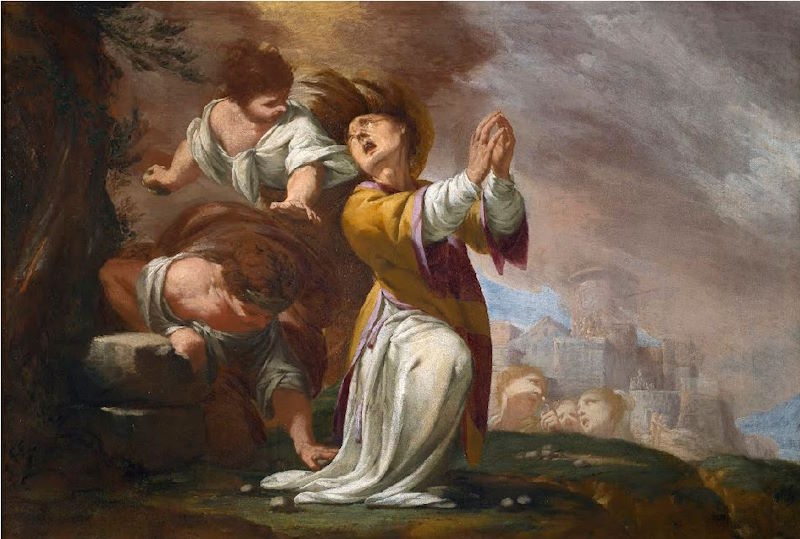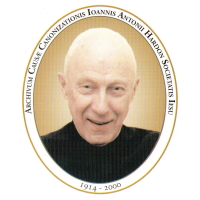by Fr. John A. Hardon, S.J.
It is remarkable that the day after Christmas we should be celebrating the feast of a martyr. The custom goes back to the very early Church. It seems that in her wisdom, the Church wanted to make sure that we associated Christ with martyrdom. There are many lessons that today’s feast teaches us. If yesterday’s was called “Christmas”, today’s has been also called “Stephenmas.” But there are especially four lessons: the lesson of love, the lesson of hatred, the lesson of conversion, and the lesson of forgiveness of one’s enemies.
Stephen teaches us in a remarkable way how soon the early Christians loved Christ with all their hearts, even to wanting to die for Him. No religious leader of history, no Buddha or Mohammed, inspires the kind of deathless love that Jesus inspired from the very beginning. And what is most remarkable about Stephen’s love for Jesus is the fact that from all evidence we have, he had never met the Master. This love was all the fruit of that Holy Spirit promised by the Savior, once He (Jesus) had gone to His Father.
Love Unto Death
We have the assurance, therefore, that we too can love Christ deeply and can love Him even to dying for Him, even though we have never seen Him in the flesh, because the love of Christ is a love of the spirit. Certainly, our bodies love, but then it is only an overflow of the deep-down invisible power of affection possessed by the spirit of man. How we need to know and teach others that love is interior! Love is not of flesh and blood, though flesh and blood will be involved. Indeed, with Jesus and with Stephen, flesh and blood were involved; but love is within. Stephen loved Jesus, and he showed his love by dying for Him.
The second lesson of Stephenmas is about hatred. It is almost past belief that once the enemies of the Savior had wreaked their hatred on Him personally, had condemned Him to death and jeeringly watched Him expire on the cross, that their strange appetite would have been satisfied. But no. What the enemies of Christ hated was the Spirit of Christ, whether that Spirit of Christ was in Him personally or in His followers. Christ was hated and the hatred cost Him His life; His followers are hated, and the world continues to do His followers to death. We need to remind ourselves that one half of the human race today is living in virtual slavery. Several hundred million Christians are enslaved by the communist enemies of Christ. So it was so it is. We must remember that it is not strange. Strange? With the martyrdom of Stephen, we see that it couldn’t have come sooner.
What is perhaps strange, though, is that the first martyr was not one of the apostles but was one who apparently had never met Jesus. But anyone who seriously tries to follow in the footsteps of the Master, as Christ foretold, will have to pay in his or her measure the price that Christ paid: of being rejected; of not being accepted; of being opposed; and, as far as the world can with its wealth and power, of being crushed for no other reason than that we are trying to follow Jesus.
Persecution and Imprisonment
No solitary location can protect us from this kind of opposition, because the worst kind of persecution of the Church today, though it also may involve imprisonment and even death, is persecution of the mind. Ideas, virulent and assaulting ideas, are being broadcast through the media of communications and have deeply penetrated into episcopal residences, priest’s rectories, monasteries and convents throughout the Catholic world. Would to God that those ideas had always been rejected! That’s the second lesson of Stephenmas, that even as the physical Christ died on the cross, so the Mystical Christ in His members, from the beginning and even now and until the end of time, will be opposed.
The third lesson is the lesson of the miraculous conversion of Saul. It is not as a trivial aside that Saint Luke, the disciple of Saint Paul, mentions this. We may be sure that Paul told him, “Now Luke, remember that I was there when they stoned Stephen. Write it down: I consented.” So Luke did, and indicated that when Stephen prayed for those who were stoning him, he was praying with emphasis for Saul. Let us never underestimate the power of sacrificial prayer. Stephen’s martyrdom was recorded so that for all times we might be told, in the most emphatic way, how pleased God is with our prayer joined to suffering, or our suffering joined to prayer. How powerful that combination is to convert sinners!
I can just imagine the conversation that Paul and Stephen are having in heaven today, no doubt Paul thanking Stephen and Stephen telling Paul, “Don’t mention it.” How powerful we are in converting a very, very sinful world provided we have learned the mystery of sacrificial prayer. We do the suffering, we do the praying; God does the rest.
Who Are Our Enemies?
Finally, in imitation of the Savior, even as Stephen was being stoned, while he was still able to speak, he forgave those who were killing him. This is the lesson we are to learn: in like manner are we especially to pray for those who have done us wrong, or who are doing us wrong. Whether that wrong is real or whether it is mainly in our own imagination—they are, in plain English, our enemies. There are many definitions of “enemies”; here is one of mine: an enemy is a person I don’t think love me. Maybe she does, but it sure doesn’t look like it! We tend not to love those whom we think don’t love us. And of course, in competition with ourselves, who could possibly love us as much as we love ourselves? In one sense almost everybody is at least a potential enemy. How could anyone measure up to the deep, strong, self-sacrificing and embracing affection we have for ourselves? We are to love in all the ways that love shows that it loves and with emphasis, those who are either evidently or ostensibly not loving us.
Saint Stephen was, as the Church called him, “the protomartyr.” That means more than just the first martyr chronologically. “Proto” means that he is the prototype of what every follower of Christ ought to be, one who is so deeply in love with Jesus that he is willing and more than willing to die for the One whom he loves. And as we know, the hardest part of dying for Christ is living for Him. It is that “dying” life which is so costly. That is why we should invoke Saint Stephen, asking him to teach us how to love Christ by living a dying-life for the One whom we say we love.
Transcription of the Homily
by Father John A. Hardon, S.J. to the:
Handmaids of the Precious Blood
Copyright © 1998 Inter Mirifica

